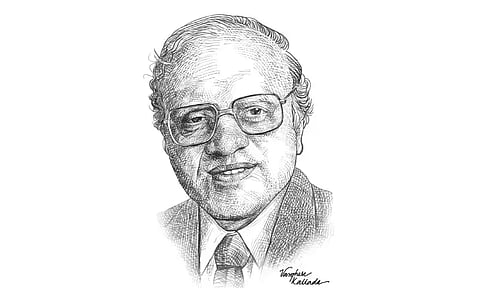

CHENNAI: Mankombu Sambasivan Swaminathan, fondly addressed as ‘MS’ by his friends and colleagues, made the stellar contribution of making the nation food-grain surplus, ending dependency on American wheat imports.
Swaminathan batted for ‘evergreen revolution’ to ensure food and nutrition security for all, along with the sustainability of global food systems. He played a significant role in changing the trajectory of the agriculture sector when farmers were dependent on archaic farming techniques.
Born in Kumbakonam on August 7, 1925, to MK Sambasivan and Parvati Thangammai, he dedicated his entire life to improving agriculture and the income of farmers.
Swaminathan’s research as a plant geneticist addressed the issue of food insecurity and helped small farmers augment their income by enhancing productivity. He began his research career with cytogenetic studies on potato in 1949 at the Agricultural University, Wageningen, the Netherlands, and later at Cambridge University, where he obtained his PhD in genetics in 1952, according to an article in Current Science (Living legends in Indian science).
His noteworthy contribution to cytogenetics and breeding of potato, led to his appointment in the Central Rice Research Institute (CRRI-Cuttack) to work in the indica-japonica rice hybridisation programme to develop fertiliser-responsive varieties of rice suitable for the rice growing tracts in India.
One of Swaminathan’s most iconic contributions came in the form of a rice variety known as IR8, also called ‘Miracle Rice’. This high-yielding variety had a significantly shorter growth cycle, allowing for two crops a year.
The IR8 rice variety was a game-changer for Indian agriculture. It boosted rice production, ensuring food security, and improving the economic condition of millions of farmers.
MSS had written that seeds of the green revolution were first sown in the fields of CRRI through the indica-japonica rice crosses, and decided that the plant type should be tailored to be functionally responsive to external application of fertilisers. The work resulted in varieties like ADT27 and RASI cultivated in Tamil Nadu.
He was given the title of ‘Father of Economic Ecology’ by the UN Environment Programme for his contribution to agriculture. In 1988, he founded the MS Swaminathan Research Foundation (MSSRF), a not-for-profit trust, with the proceeds of the first World Food Prize he received in 1987. It’s dedicated to ‘accelerate the use of modern science for sustainable agricultural and rural development’.
Swaminathan handled many official roles, including that of the chairman of the National Commission on Farmers, and President of the Pugwash Conferences on Science and World Affairs, director of the Indian Agricultural Research Institute (1961-72) and director general of the Indian Council of Agricultural Research, and secretary, GoI, Department of Agricultural Research and Education (1972-79).
He was awarded the World Food Prize for developing and spearheading the introduction of high-yielding wheat and rice varieties in India in the 1960s when the country faced the prospect of wide-spread famine.
Swaminathan was also a former Rajya Sabha member (2007-13) who chaired the Task Force set up by the Ministry of External Affairs to oversee the projects undertaken in Afghanistan and Myanmar in the field of agriculture. He received 84 honorary doctorate degrees from universities around the world, and spent two decades in research and administrative positions at agricultural institutes. He was elected as the ‘Living Legend of the International Union of Nutrition Sciences’ at the 20th International Congress of Nutrition held at Granada, Spain.
He was a Fellow of many of the leading scientific academies of India and around the world, including the Royal Society of London and the US National Academy of Sciences.
A prolific scientific writer, Swaminathan had published 46 single-author papers between 1950 and 1980 in the field of crop improvement, genetics, cytogenetics and phytogenetics. He also wrote books around the general theme of his life’s work, biodiversity and sustainable agriculture for the alleviation of hunger.
MS Swaminathan passed away in September last year in Chennai. He was 98.